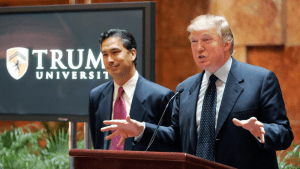Was Trump University a Fraud?
Trump University was founded in 2004 and marketed as a place for students to learn real estate strategies and practices that would generate large profits. Since its inception, the institution changed its name to Trump Entrepreneur Initiative LLC and Donald Trump, along with other co-founders, have been sued three times by New York State, a group of plaintiffs from California, New York and Florida, and an individual plaintiff in California. The suits allege fraud and misrepresentation.
Trump has counter-sued in one instance, accusing a plaintiff in one of the suits of malice. He lost the case and also lost the appeal. Trump also made statements that he has been on the on receiving of bias by New York State Attorney General Eric Schneiderman, and also by a judge whose 2014 ruling allowed the claims against him to proceed. Trump himself can be held personally liable if he is found guilty of fraud.
TEI ceased operation in May 2011. All three suits are still in progress, but recent rulings suggest that whether Trump University was a fraud will be determined based on proof of repeated instances of fraudulent behavior that must fall within a specific time range.
New York State Accuses Trump of Fraud
The suit filed by New York State in 2013 was for $40 million and alleged that Trump University and TEI engaged in illegal business practices and made false claims that misled thousands of people. Some former students said they believed, based on course promotional materials, that they would learn from instructors who were “hand-picked” by Trump. They also believed that they would be taught Trump’s personal real estate strategies in the course material. 
Instead, the former students alleged that their instructors had never met Trump, and that the course material was of low quality with no practical application. Some believed they would get to meet Trump and were disappointed when instead they were given photo ops with a cardboard cutout of Trump.
While a New York state judge ruled that Trump could be held personally liable for legal claims against him, a statute of limitations issue has limited the evidence that can be used against Trump in the case. Fraud cases like this must be brought within six years of the alleged fraud. Since Trump University and TEI stopped operating in 2011, the strength of the case will be determined by the strength of the evidence the AG has for the period of time within the statute of limitations.
Students Claim They Didn’t Get What They Paid For
The remaining two cases contain similar claims. Students say they each paid almost $1500 for an introductory seminar and later were told to spend up to $35000 on additional training. Others expected in-person classes, but sought refunds after finding out their courses would be held online or in other states. Multiple students were told that they couldn’t get a refund after three days had passed, though in at least one instance, tuition was eventually refunded.
Much of Trump’s defense stems from the existence of positive student reviews, including some by the plaintiffs. However, a judge has allowed the suits to proceed on the reasoning that people who have been swindled must have at one time trusted the swindler, making surveys completed by the students before they believed they were being defrauded irrelevant. Students have also said that the surveys were filled out under pressure to give good reviews.
Was Trump University Actually a University?
New York State notified Trump University in 2005 and again in 2010 to stop using the word university in its name because the institution wasn’t chartered to be a university and wasn’t licensed for live instruction under New York State law.
In 2010, Trump University changed its name. However, alleged violations of education law were dismissed as part of the 2014 ruling in the NYS AG suit. The cases are proceeding based on allegations of fraud under Executive Law section 63.12, which defines fraud as any “device, scheme or artifice to defraud and any deception, misrepresentation, concealment, suppression, false pretense, false promise or unconscionable contractual provisions,” and focuses on the illegality of persistent and repetitive fraudulent actions.
This indicates that issues of how the university used its name are being sidelined and the focus going forward will be on how each side can prove the relationship between what was advertised to the students and what they obtained.
If the AG and plaintiffs have enough evidence to prove persistent and repetitive fraudulent actions within the six year statute of limitations, it will be clear that Trump University was indeed a fraud. This could provide legal precedence for students of similar institutions to make similar claims of education fraud against their institutions.


Comments